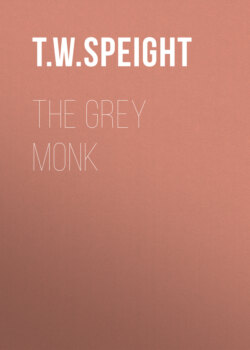Читать книгу The Grey Monk - T. W. Speight - Страница 13
На сайте Литреса книга снята с продажи.
CHAPTER VIII. THE EBONY CASKET.
ОглавлениеAT five minutes to twelve the two Miss Thursbys, who prided themselves on their punctuality, entered the drawing-room together, or rather, to speak more correctly Miss Matilda entered first, with Miss Jane close on her footsteps, this happening to be the former's month for enacting the part of elder sister, as a consequence of which she wore what might be termed the "chain of office" with its pendant locket. That something out of the common was on foot could not be doubted, seeing that at that early hour of the day the sisters were already attired in their puce-coloured lutestring gowns, and were wearing their "company caps" and best lace mittens--a conjunction rarely, if ever, witnessed except when some special visitors were expected at Vale View.
Earlier in the day--before breakfast, indeed--they had told each other sadly and for the last time, as if their courage needed stimulating by reiterated assurances, that a certain revelation must no longer be delayed. It had been Matthew's--their dead brother's--wish that Ethel should be told on her nineteenth birthday, and with them his wishes had always been law. And yet it was a grievous thing to have to do. It seemed to them that after to-day "the child," as they still continued to call Ethel between themselves, could never regard them with quite the same eyes as heretofore. Very downcast they looked as they sat there on the ottoman, side by side, waiting for the timepiece to chime the hour of noon.
They were tall fair women, thin without being in the least degree angular; with blue eyes, rather long straight noses, and a slight droop at the corners of the mouth, which, when they were not engaged in conversation, lent them an habitually pensive air, although, in reality, they could be sprightly enough on occasion. When younger they had been noted for their lovely pink-and-white complexions, and their cheeks still retained the delicate ivory clearness of an arum lily. If one had been asked to sum up in the fewest possible words the predominant expression of the twin sisters--so strangely alike and yet not without discernible points of difference--one would have said that it was a mixture in equal parts of sweetness and goodness, and, in so saying, one would not have been far wrong. How it had come to pass that two such women--or neither of them--had never married, was one of those delicate problems which no mere bystander is justified in trying to solve. That they themselves could have told the reason why, had they chosen to do so, is scarcely to be doubted.
On the centre table stood a quaintly carved ebony casket, clamped with silver and having a silver plate let into the lid, on which, in Old English characters, was engraved the monogram, "M. T." Tamsin had brought it in and placed it there a few minutes before the entrance of the sisters.
Scarcely had the timepiece chimed the last stroke of twelve when the door opened and Ethel entered the room. Miss Matilda rose and, crossing to her, embraced her tenderly, an example which was at once followed by Miss Jane. This ceremonious greeting, taken in conjunction with her aunts' "robes of state," and the presence of the ebony casket, which she had never seen opened, but which, as long as she could remember, had been known to her as the depository of Uncle Matthew's papers, all sufficed to convince the girl that some momentous occasion was at hand. Her cheeks paled perceptibly and her limbs began to tremble. Then she drew in her breath, called herself a coward, and asked herself what she had to fear. A moment or two she stood, and then she seated herself in the pretty fancy-chair which she called her own. It had been her Aunt Jane's gift on her sixteenth birthday.
"My dear child," began Miss Matilda--and then she was compelled to pause for a few seconds before she could continue--"My dear child," she repeated, "your Aunt Jane and I have asked you to meet us in order that we may reveal to you certain circumstances connected with your early history of which you have heretofore been kept purposely in ignorance, but which it was the desire of our dear brother should be made known to you on your nineteenth birthday. That day has now arrived, and we are here in order to carry out our brother's wishes."
